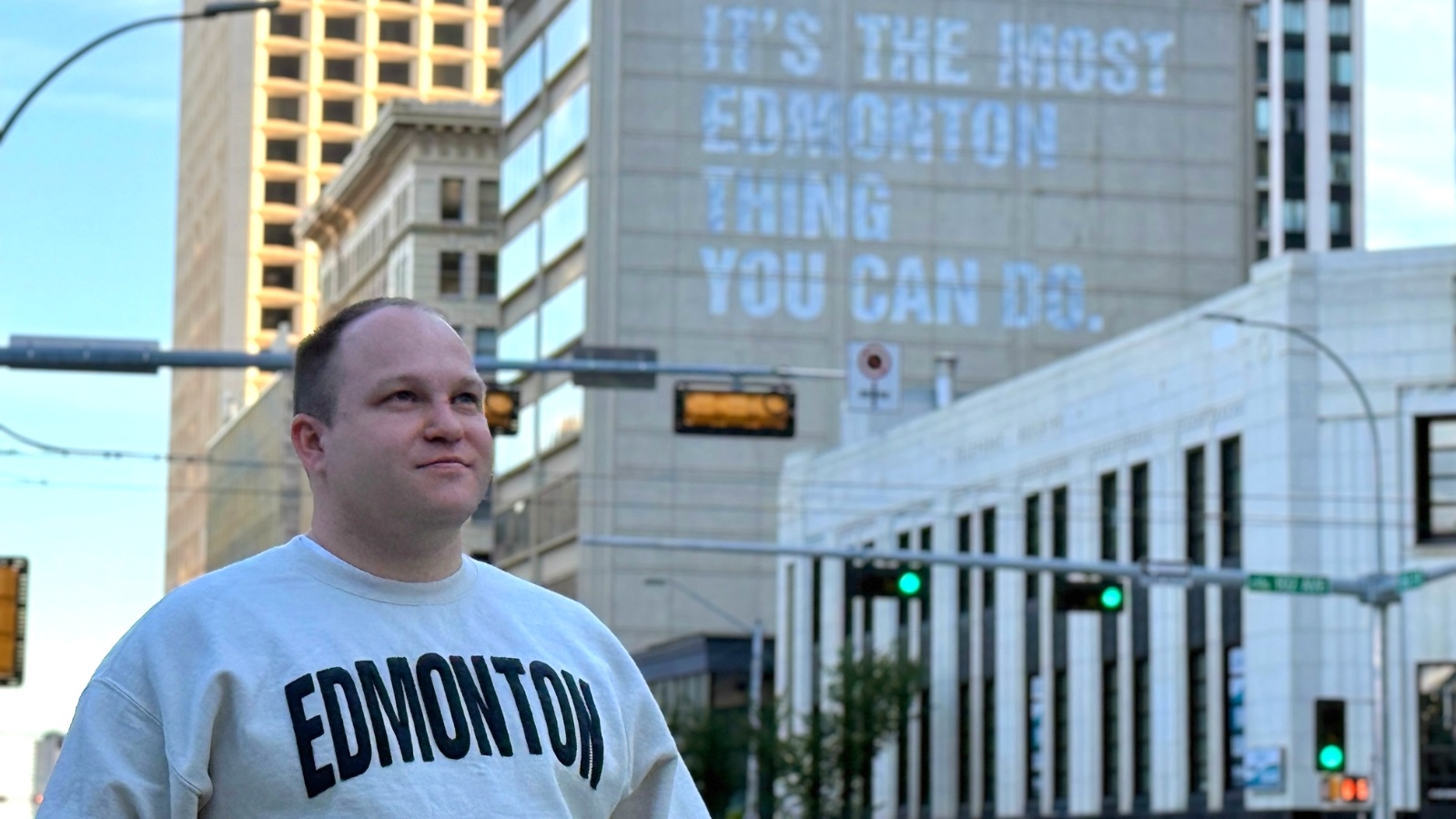Photo courtesy of © Paul Bakhmut
Paul Bakhmut leans into the camera and smiles.
The word “EDMONTON” appears in giant block letters across his chest, foreshadowing what would soon become the focus of our conversation.
We start with small talk and catching up. We saw each other a month earlier during Stampede in Calgary and had been trading messages on LinkedIn about our shared admiration for tech events like Startupfest in Montreal since.
But he wasn’t joining me this time to talk about startup events.
“I’m here to share some news,” the Edmontonian says while rocking back and forth in his living room chair. “I’m going to be announcing I’m running for mayor of Edmonton.”
The conversation that followed focused on what the city needs now, and what he is calling “The New Edmonton” backed by a platform built on innovation.
A familiar face in the tech and innovation community, Bakhmut recently went on leave from his role as a senior policy advisor in Alberta’s Ministry of Technology and Innovation to launch his bid for mayor.
He first signalled the move on LinkedIn but didn’t share detail beyond a teaser and a vision for building something different. Comments poured in from people wishing him well and asking how they could sign up for more information.
Over the last week he’s shared short posts describing a movement to reimagine the city. Hundreds of people have engaged with the posts, and more than 100 signed up for a newsletter that doesn’t yet exist, for a campaign that hasn’t yet been announced, for a candidate that didn’t even have a website.
But that’s the kind of response that comes when a well-known connector puts an idea into the world.
In an exclusive interview with Digital Journal, Bakhmut explained what an innovation-driven candidacy could look like and outlined his plans for “The New Edmonton” which he says is both a campaign and a broader movement to reimagine how the city works.
Bakhmut and I have spoken several times, including back in January when Digital Journal brought a team to Edmonton to get connected and learn more about the region’s innovation ecosystem as part of our Western Canada expansion.
That work set the stage for what feels like a larger moment now, with leadership, innovation and civic direction converging. It was in that context that he decided to share his plans with me in our meeting.
His three themes for the campaign are open, smart, and fun.
The ideas may sound simple, but they carry a pointed message. Bakhmut says Edmonton needs more transparency, modernized services, and a culture that makes people want to live, work, and build in the city.
He describes “The New Edmonton” as a way to position the city for growth by making entrepreneurship mainstream, delivering public services that match the ease of commercial apps, and actively marketing the city’s assets to attract new business.
For him, leadership is about opening doors and removing barriers, and he frames the role of mayor as the city’s chief business development officer.
From provincial halls to local politics
Bakhmut isn’t new to city politics. In 2019, he worked at City Hall for a councillor, supporting everything from constituent feedback to policy research. That experience, he says, gave him an appreciation for how council works and how difficult it is to engage directly with citizens.
“The city really lacks a proper citizen engagement platform,” he says. “For councillors and the mayor, there’s no easy way to talk to the people they represent. Discovering the issues that people care about is not done efficiently. I hope to use this campaign to run some experiments and use the latest technology to really understand what people care about at a deeper level and incorporate it in the platform as we go.”
Bakhmut moved to Edmonton in 2010 as a student and has spent more than a decade in the city, with a short stint in Calgary.
In 2023, he founded Edmonton Tech Wednesdays, a weekly informal gathering that became a fixture in the city’s innovation calendar.
In 2024, the startup community recognized him with its Connector of the Year award. His presence in grassroots events, provincial policymaking and the networks that tie Alberta’s tech community together has made him a familiar and well-regarded figure across the province.
 Photo by Lisa Marie, Getty Images / Canva Pro
Photo by Lisa Marie, Getty Images / Canva Pro
Building a city that’s open, smart, and fun
Bakhmut’s platform is based around being open, smart, and fun and those elements are missing ingredients in the way the city runs, he says.
“Open” begins with transparency and Bakhmut wants Edmontonians to be able to track every dollar of the city’s $3.5 billion budget. He supports adopting open contracting standards already used in other jurisdictions that require governments to publish contract and tender data in a consistent, accessible format so anyone can see how public money is being spent.
“It makes it easier for businesses to sell to government, easier for journalists to hold government accountable, and easier for citizens to trust government,” he says.
“Smart” is about modernizing how the city operates. Edmonton’s transit system, for example, still requires riders to buy and reload plastic cards instead of tapping a phone or credit card. Permit approvals can stretch for months. Even parking enforcement still relies on officers writing tickets by hand in the middle of winter, he says.
“I live in the city, and I use these services,” Bakhmut says. “Every time I use them, I can’t help but think they can be a lot better. If someone wants to use a program, they have to download forms, fill them out, sign them by hand, scan them, email them. Why can’t this be as easy as posting a photo on Instagram? Why can’t I do it in three taps? Why do I have to go somewhere in person?”
The third pillar, “fun,” might sound light, but for Bakhmut it is a serious part of economic growth. He points out that arts, culture, nightlife, and even architecture are central to attracting both businesses and people.
“If there’s nothing happening, or if there are no events, people won’t move here,” he says. “If you have a great city that people can enjoy, they will want to move here. Having those components will help with business attraction, with revenue generation for the city, better services, and lower taxes.”
Bakhmut says he also hopes to change views around entrepreneurship. He notes that Edmonton is often seen as a government town, but it has a growing and underused base of tech talent and he wants to build a stronger culture of starting businesses — an approach also championed by Edmonton Unlimited.
“We don’t have unicorns in Edmonton yet,” Bakhmut says, referring to tech companies that are valued at more than $1 billion. “I would really like to change the tone and the narrative on entrepreneurship to make it more mainstream, to make it seen as a viable avenue for people of all ages and backgrounds.”
That vision comes at a time when startup ecosystems around the world have seen their valuations decline, and Edmonton was no exception.
A Startup Genome report found the city’s ecosystem shrank by 11% in value over the past year, even as strengths in areas like AI and life sciences continue to emerge. For Bakhmut, that’s a reminder that turning entrepreneurship into a mainstream path will require both cultural and policy change.
Lessons from provincial politics
Bakhmut has been part of teams that have driven an innovation agenda before.
For the last three years he served as a senior policy advisor in Alberta’s Ministry of Technology and Innovation, a role that put him at the centre of efforts to modernize how services are delivered and how emerging technologies like artificial intelligence can be adopted responsibly.
He says the experience taught him both the potential and the challenges of digital transformation.
“One of the reasons we were able to make a lot of progress in the province was strong support from the top,” he explains. You need buy-in from the bottom and support from the top, and you have to work on it frequently, keep focused, and be consistent.”
Just as important, he adds, was learning how to work with the public service itself.
“It takes a lot of people to introduce change and you have to get them on board,” he says. “Transforming government is not easy.”
For Bakhmut, those lessons translate directly to the municipal level. Edmonton’s challenges with outdated systems and slow processes, he argues, are not so different from what he saw at the provincial level. The difference is scale, and the mayor needs to set the tone and collaborate with city council as a team sport.
 Photo courtesy of Paul Bakhmut
Photo courtesy of Paul Bakhmut
Rethinking opportunity in the city of champions
As our conversation turned to Edmonton’s future, Bakhmut pointed to opportunities the city has overlooked.
He describes a recent visit to the Edmonton Energy and Technology Park, a 49-square-kilometre parcel of land on the city’s edge that was conceived in 2008 as a hub for industry and research. More than 15 years later, the site remains largely undeveloped.
“I went there to see it firsthand. I saw fields. I saw some cows. I saw transmission lines. But there’s nothing there. There’s nothing there.”
For Bakhmut, that land is a metaphor for Edmonton. He says the city has strengths and assets, but it isn’t building on them or telling the story needed to attract investment. The site is a reminder of how the city has struggled to turn strategy into results, and he argues that stronger leadership is needed to close the gap between planning and delivery.
Bakhmut believes that some areas of focus for Edmonton to lead include advanced manufacturing, life sciences, semiconductors, and commercializing ideas from the deep research that happens in the city’s academic institutions.
The city’s future, he says, depends on leadership that is willing to modernize services, support entrepreneurship and position the city to compete globally.
“From a citizen’s perspective, people sometimes don’t have a clear line between which level of government provides which services,” he says. “They just want a great experience and they want services that are useful and usable regardless of which level of government or which department inside the government provides them.”
For Bakhmut, that means Edmonton’s next mayor will have to focus less on jurisdictional battles and more on making the city open, responsive, and attractive to new ideas.
